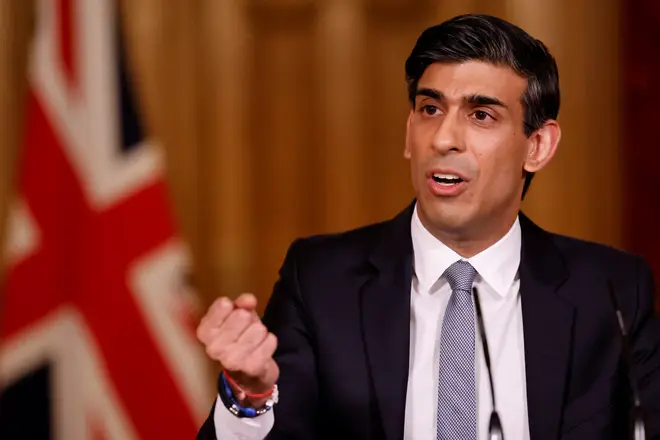
Ian Payne 4am - 7am
4 March 2021, 10:44 | Updated: 4 March 2021, 11:21

Rishi Sunak's spending plans outlined in the Budget "do not look deliverable, at least without considerable pain", the Institute for Fiscal Studies has warned.
Labelling the Chancellor 'Scrooge Sunak' after announcing a raft of spending cuts and tax rises, IFS director Paul Johnson said it was a "tale of two budgets" with fiscal tightening of over £30 billion unveiled relative to previous plans.
"How he is actually going to fix the public finances remains to be seen," Mr Johnson added.
Explained: Budget 2021 at a glance
Read more: Sunak defends Budget tax measures, telling LBC UK will be 'internationally competitive'
The IFS also criticised Mr Sunak's lack of announcements to tackle the long-term consequences of the pandemic.
Mr Johnson said this was a "hole that needs to be filled and soon" and warned that 'super deductions' were likely to only be a short-term fix.

Nick Ferrari scrutinises Chancellor Rishi Sunak over corporation tax
"Santa Sunak, purveyor of billions today looks more like Scrooge Sunak," Mr Johnson said.
He added that two big tax increases announced on Wednesday were "both screeching U-turns on Conservative policy over the last decade" with a rise in corporation tax of "historic proportions".
Discussing the impact of cuts on public services and the welfare system, he warned that reversing the Universal Credit uplift could leave vulnerable families £80 worse off each month.
Read more: Furious 'excluded' caller hits out at Chancellor Rishi Sunak after Budget
Criticising the lack of planning for social issues, he said: "No money to deal with post-pandemic priorities, no policies to deal with the inequalities that have opened up over the last year between rich and poor, old and young, more and less well educated.
"This is a big hole in the Chancellor’s and the Government’s policies."
It is a sad truth that current budget balance in Mr Sunak plans will require the highest sustained tax burden in UK history and yet more cuts to spending on "unprotected" departments. A problem created by a decade of paltry growth followed by the deepest recession in history
— Paul Johnson (@PJTheEconomist) March 4, 2021
Mr Johnson said the Chancellor was "gambling that raising corporate taxes" would not have "too terrible an effect on investment" as UK rates remain one of the lowest among the most powerful countries.
Mr Sunak defended the 6% corporation tax hike on LBC on Thursday morning, claiming the UK "will continue to be an internationally competitive country" despite the historic changes.
"Even after the increase in corporation tax which remember is not going to happen for a couple of years from now, so after we've got through this and start recovering," he said.
Read more: Furious 'excluded' caller hits out at Chancellor Rishi Sunak after Budget
"We will still have a lower corporation tax rate than all of our large G7 economies.
"The actual OECD numbers that compare countries on a comparable basis show that we would have the lowest effective corporation tax rate out of the G7, the fifth-lowest in the G20 and with the super deduction we shoot from up from 30th to first over the next two years in terms of this being an attractive place to invest.
"I feel very confident that this will continue to be an internationally competitive country with initiatives like free ports, for example, our investment in R&D and innovation."

Sir Martin Sorrell: Hike in corporation tax is 'needed'
It follows warnings from the Office for Budget Responsibility (OBR), the independent public body that provides economic forecasts, that a single percentage point increase in Government borrowing would cost more than the hike in corporation tax would raise.
The high levels of national debt also means the public finances are "much more exposed" to changes in interest rates, OBR chief Richard Hughes said.
Read more: Excluded UK co-founder says budget is "only a teeny tiny concession" to self-employed
Debt, including the Bank of England, is expected to remain above 100% of gross domestic product (GDP) - a measure of the overall size of the economy - through to 2025/26 according to the OBR forecast.